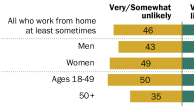The dot-com meltdown and the Web
Background
In mid-March, the Pew Internet & American Life Project issued a report entitled “Risky Business: Americans see greed, cluelessness behind dot-com’ comeuppance.”1 Six months after asking online Americans about how the impact of Internet companies’ problems on their experiences on the Internet, we decided to ask more questions because the economic circumstances of these companies and many other U.S. firms had grown worse in a half year. And we asked all Americans, Internet users and non-users alike, about their impressions about the importance of the dot-com meltdown.
Our survey was conducted between August 13 and September 10, the day before the terrorist attacks on the World Trade Center and the Pentagon. It shows that Americans still hold many of the same views, though more now think the problems of dot-com firms are affecting the online world and the overall U.S. economy. And the dot-com troubles are beginning to impinge on the day-to-day experience of the Internet that online Americans enjoy.
The changing Web environment for users
It is clear that the dot-com meltdown has begun to affect the Internet experience of millions of Americans. One in six Internet users (17%) has been asked to pay for access to a Web site or service that she used to access for free. And 12% have seen one of their favorite sites go out of business. This latter figure represents a 50% growth from the February data, which showed that 8% of Internet users had lost a favorite site.
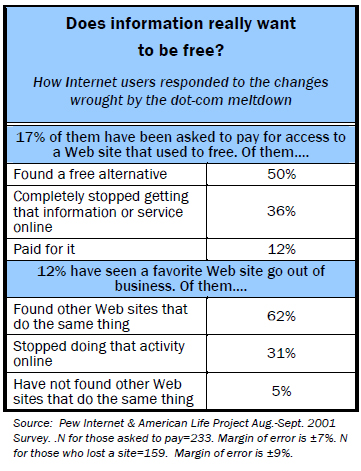
The changing Web environment for users
It is clear that the dot-com meltdown has begun to affect the Internet experience of millions of Americans. One in six Internet users (17%) has been asked to pay for access to a Web site or service that she used to access for free. And 12% have seen one of their favorite sites go out of business. This latter figure represents a 50% growth from the February data, which showed that 8% of Internet users had lost a favorite site.
The majority of those who faced these changes found alternatives on the Web that did not cost money and gave them the same content or service. In each case, roughly a third of those affected decided to stop seeking that information or service online.
The level of a user’s Internet experience was clearly associated with his response to the new Internet environment. Newcomers with a year or less of experience were more likely than veterans to abandon an online activity when they were asked to pay or when they lost a favorite site. Conversely, veterans were more likely than those with less experience to find alternatives – for free.
A drop-off in Web site growth
This impact on Internet users’ experience comes at a time when the number of Web sites continues to grow, but at a considerably slower rate that in the boom years in the late 1990s. There is no authoritative source for the size of the commercially-oriented Web – i.e., the dot-com space. Nor has there been ongoing research about the total number of Web pages that exist. However, a useful proxy for the overall size of the Web can be seen in the work of the Online Computer Library Center. Its Web Characterization Project found recently that there were 3.1 million public Web sites worldwide as of June 30, 2001.2 The center says that these Web sites represent 36% of the Web as a whole.
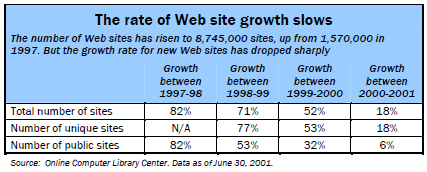
“From 1997 to 2000, the public Web increased by about 700,000 sites each year, but increased by only 200,000 sites between 2000 and 2001,” the OCLC found. Overall, the Center found that there are 8.7 million Web sites worldwide — a number that consists of public sites, duplicates of these sites, sites offering content for a restricted audience and sites that are under construction.
“Over the past year, the Web as a whole grew by 18 percent, reaching an estimated total of nearly 9 million sites,” continued the OCLC in its report this summer. “Although more than 1.3 million new sites were added to the Web during this period, growth over the past year is substantially slower than that observed between 1998 and 1999 (71 percent) or 1999 and 2000 (52 percent).”
The dimensions of the dot-com meltdown
Research by Webmergers.com, a firm that specializes in assessing the environment for buyers and sellers of technology properties, shows that the dot-com demise was particularly heavy in the first months of 2001.3 Since January 2000, the firm reports that 555 significant Internet companies (firms that gained serious levels of funding from investors) have closed their doors. “More than nine times as many companies shut down in the first half of 2001 as in the first half of 2000…(330 in 2001 versus 36 in the same period in 2000),” Webmergers.com reported. But the rate of new closures this spring seemed to level off. The firm reported that the number of shutdown was 54 in May and 53 in June.
Some of the most notable dot-com failures this year have included online publications like TheStandard.com, travel sites like Biztravel.com, retail sites like Petstore.com, and music sales sites such as MusicMaker.com.
Personal toll
The collapse of the dot-com economy has had tangible effects on some Americans’ personal lives. Our August-September survey shows that about 14% of Americans personally know someone who has either been laid off from a failed Internet company or a company that provided Internet-related services. This is up from the 9% of Americans we found in the February 2001 survey. Also, the percentage of Americans who have lost money investing in dot-coms rose from 7% in February to 12% in the August-September survey.
The Americans who have been personally affected by the dot-com collapse tend to be wealthier and more educated. About 29% of college educated Americans have an acquaintance that lost his or her job, and 27% have lost money on dot-coms. Only 8% of those with only a high school diploma have a newly unemployed friend, and only 6% have lost money due to failing dot-coms. Likewise, 29% high earners over $75,000 a year have seen a friend lose their job, ands 27% have lost money on dot-com stocks.
Internet veterans have felt the personal toll the most as well: 29% of Internet veterans with three or more years of online experience have seen a friend lose their job, while 17% of those with a year or less online have had the same thing happen. Almost a quarter (24%) of these vets have lost money as well.
Americans’ views about who is to blame
We reported in March that the earlier survey showed that 67% of all Americans were aware of the financial problems of many dot-com companies. The August-September survey showed the exact same thing, though the percentage who said they had heard “a lot” about the dot-com troubles had grown slightly from 30% to 34% in the intervening six months.
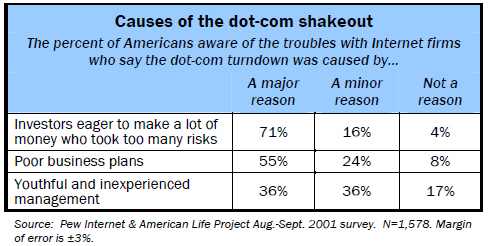
Most of those following the story still blame greedy investors most often for the problems in the sector. Of those who were at least somewhat aware of the troubles at Internet companies, more than 7 in 10 cited incautious investors as the problem, more than half blamed firms that did not have a clear plan for how they would make money and a bit more than a third cited the fact that many of the owners of Internet firms were young and inexperienced.
Americans’ views on the changing online world
The failure of more and more dot-coms and their attendant Web sites is causing some Americans to reassess their view of the online world. In February 2001, we found that 57% of all Americans who had heard about the industry’s troubles believed that it was a good thing for some Internet companies to close because “there were too many Web sites that had too little to offer.” Six months later, that number has fallen to 48%, as some Americans have seen their favorite Web sites or other Web sites they used collapse. Likewise, the percentage of people who worried about shrinking choice online rose.
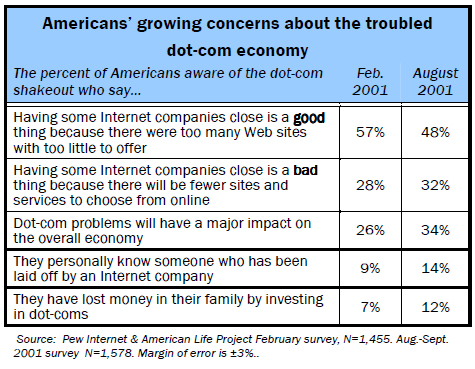
While both men and women have lamented the closure of some of their favorite Web sites, women have felt the difference more than men. The percentage of women who feel that the closing down of dot-coms was a good thing fell from 56% in February to 44% in August. Meanwhile, the percentage of men feeling the same way fell from 58% to 51%.
Younger users have felt the loss of Web sites strongly as well – about 41% of users between the ages of 18 and 29 see the collapse of many Web sites as a bad thing, while 31% of baby boomers between 50 and 64 and 17% or seniors feel the same way.
Many of those who use the Internet have second thoughts about the meaning of the dotcom failures. In February 61% of Internet users thought weeding out Internet companies was a good thing; in August, half (50%) of users felt the same way. Meanwhile the percentage of users who thought the closure of Web sites was a bad thing rose from 30% of users in February to 37% in August.
Meanwhile, more Americans expressed the view in August that the financial problems of the dot-coms will have a major impact on the American economy. In February, just over a quarter (26%) of Americans felt that way; by August, the percentage had risen to 34%. However, a majority of Americans still feel that the collapse of these dot-coms will have little, if any, effect on the economy – 61% of Americans feel that there will be a minor impact or no impact at all.
Again, it is important to remember that this survey was completed before America’s economy absorbed the shock of the terror attacks and the anthrax scare. These events have heightened concern about the direction of the economy overall and they have also drawn attention away from the problems of the dot-com sector to more sweeping issues related to all sectors of the economy.
Who are the most glum about the dot-com woes? Those who earn higher incomes and have lost money on the dot-coms are naturally more pessimistic about the dot-com impact on the economy. About 41% of those who earn more than $75,000 a year fear a major impact on the economy due to the collapse of dot-coms, which is double the percentage (20%) who felt the same way in February.
Those who have direct experiences with the problems in the dot-com sector are most alarmed. Just over half (52%) of those who have lost money on the dot-coms fear the collapse of the industry will have a major impact on the economy. And just about half (49%) of those who have an acquaintance that lost his or her job due to a failed dot-com see a major impact on the economy.

